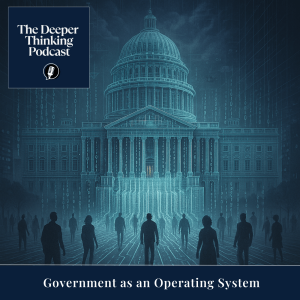
Thursday Mar 20, 2025
Government as an Operating System: Power, Control, and the Future of Governance - The Deeper Thinking Podcast
No government has ever truly fallen.
The names change. The flags burn. But the logic persists—segmentation, permission, access. A civilization may erase its monarchy, repudiate its constitution, or riot through the halls of power, yet the deeper system quietly reboots. Like a machine recovering from a forced shutdown, it searches for structure, finds parameters, reinstalls authority under a different name. Power does not die; it migrates. Forms evolve, interfaces adapt, but the underlying code remains obscure and operative.
The mistake lies in believing that governance is visual. We point to courts, offices, parliaments—as if architecture explained authority. But as Michel Foucault wrote, power is not possessed, it is exercised; it does not reside, it circulates. Governance moves through protocols, routines, surveillance, calculation. It is the logic that governs who waits and who is waived through, who receives and who is denied. Bureaucracy, once seen as soulless machinery, is now understood as the soul itself—dispersed, codified, masked as neutrality. Beneath the familiar logos of state, the deeper system is recursive, modular, and strangely impersonal. No one is at the wheel.
There is a kind of silence that radiates from this truth—the silence of automated decisions, black-box algorithms, predictive governance. The state, once imagined as a body politic, is dissolving into an architecture of processes. In place of sovereign declarations: metrics. In place of laws: code. What Jeremy Bentham imagined as the panopticon has been rewritten as a dashboard—omniscient not through walls, but through data. Every transaction feeds the system. Every deviation flags the log. And still, the interface smiles. “You are in control.”
Control, then, does not always feel like coercion. Often it feels like personalization. The illusion of agency is reinforced by the granularity of permissions. Systems do not forbid; they sort. Some users are administrators, most are guests. And so governance, once administered from thrones or pulpits, now arrives through terms and conditions—clicked without reading, enforced without violence, updated without vote. The mechanisms of rule become indistinct from the tools of convenience. Who governs? No one. Everyone. The system.
The feel of a fingerprint on glass, the vibration of a rejected transaction, the cold light of a terminal screen awaiting input. A passport gate blinking green. The low static of monitored space. Bureaucracy smells like laminate and recycled air. Security tastes of metal. The future moves without footsteps.
And yet the dream persists—that systems can be undone, that code can be rewritten. From digital communes to DAOs, from encrypted protocols to decentralized charters, a new frontier whispers of governance without governors. But this whisper echoes older myths. Plato’s philosopher-kings return as consensus nodes. The social contract is transcribed into a ledger. Nothing decentralizes quite as cleanly as promised. Even in networks without centers, hierarchies reappear—soft, invisible, emergent. The logic reinstalls itself. What is called freedom may be only a subtler form of sorting.
This is not failure. This is form. Systems adapt not to serve but to survive. Governments do not fall—they recompile. The revolution installs its own protocols. The commune elects its moderators. The archive grows, version by version, each believing itself original. Even in rupture, the code runs on.
And still, there is the recurring image: a screen, a line of text, a blinking cursor. Awaiting command. Awaiting change. Awaiting nothing at all.
***
No comments yet. Be the first to say something!